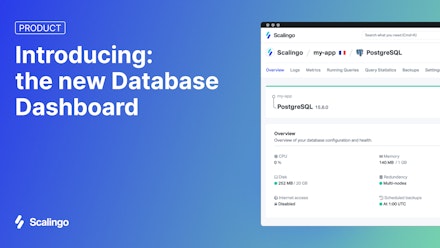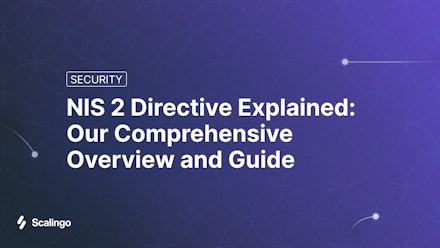Scalingo CLI 1.10 with addon logs, backups download
and more

We release today the 1.10 version of our CLI tool. This release introduces some new databases specific commands: database backups download and database logs are here!
New Features
As we recently made public our database API with its brand new unified authentication mechanism with the main API, we are able to implement new commands in our CLI tool regarding database addons which can be MySQL, PostgreSQL, MongoDB, Redis, Elasticsearch or InfluxDB. We also added in this release a few other commands you might find useful.
Addons Logs
The following commands about addons require you first get the ID of your addon:
> scalingo --app my_app addons
+---------+-----------------------------------------+--------------------+
| ADDON | ID | PLAN |
+---------+-----------------------------------------+--------------------+
| MongoDB | ad-b7751e80-26b3-43be-8f8f-e7c23f88b547 | mongo-business-512 |
| Redis | ad-a9300070-5610-0136-2a99-0242ac11003d | 512m |
+---------+-----------------------------------------+--------------------+
You can now get access to your addon logs with the same command you are used to. Just add the
--addon flag:
> scalingo --app my_app --addon addon_uuid logs
All your favorite logs flags are available:
-
--lines value: number of log lines to dump (default: 20) -
--follow: stream the logs (astail -f)
Backups Download
An other great addition is the ability to download a backup from the CLI. List your database backups with:
> scalingo --app my_app --addon addon_uuid backups
+--------------------------+--------------------------------+-------+--------+
| ID | CREATEDAT | SIZE | STATUS |
+--------------------------+--------------------------------+-------+--------+
| 5c81be904fbb095825f0d516 | Fri, 08 Mar 2019 02:00:00 CET | 44 MB | done |
| 5c806d104bfb09540a9849b9 | Thu, 07 Mar 2019 02:00:00 CET | 44 MB | done |
…
| 5b8b36104ffb090be1ac3cd9 | Sun, 02 Sep 2018 03:00:00 CEST | 40 MB | done |
+--------------------------+--------------------------------+-------+--------+
Then download the desired backup with:
> scalingo --app my_app --addon addon_uuid backup-download --backup 5c81be904fbb095825f0d516
⣟ Preparing download
15.29 MiB / 42.37 MiB [===========>------------------------] 36.08%
Three convenient flags have been added:
-
--backup value: ID of the backup to download -
--output value: output file (- for stdout) -
--silent: do not show the progress bar and loading messages
Multi-accounts Simplified
Some of our clients have multiple accounts on Scalingo depending on the project they are working on. For these customers, using the CLI is sometimes confusing as you never know which account one is logged in with. We implemented a couple of new features to help in this use case:
The whoami Command
scalingo whoami (and its alias scalingo self) prints on the standard output the username and
email address associated with the currently logged in account:
> scalingo whoami
-----> You are logged in as etiennem (etienne@scalingo.com)
The --password-only Flag
When trying to login with the login command, we first try to automatically login using the SSH
key. In some cases, you might want to only login using the password. We added the flag
--password-only to the login command to temporarily disable the automatic SSH login attempt.
Many Other Changes
This release also includes various small improvements.
Router Settings
We introduced advanced router features a year ago. These features are now configurable through the CLI:
-
force-https --enable|--disable: Enable/Disable force HTTPS. -
sticky-session --enable|--disable: Enable/Disable the sticky sessions. -
set-canonical-domain/unset-canonical-domain: Set/Unset a canonical domain.
Support new SSH key format
As of OpenSSH 7.8 release, the ssh-keygen tool generates by default the keys in a new format. We
updated our CLI to support this new format so that you can use it to access Scalingo.
OpenSSH changelog entry notifying this modification.
This release also includes a few cosmetic changes. The source code of our CLI is open source and the full changelog is available.
How to upgrade
Just install the latest release by typing this command in your termninal:
curl -O https://cli-dl.scalingo.io/install && bash install
Photo by Hack Capital on Unsplash



